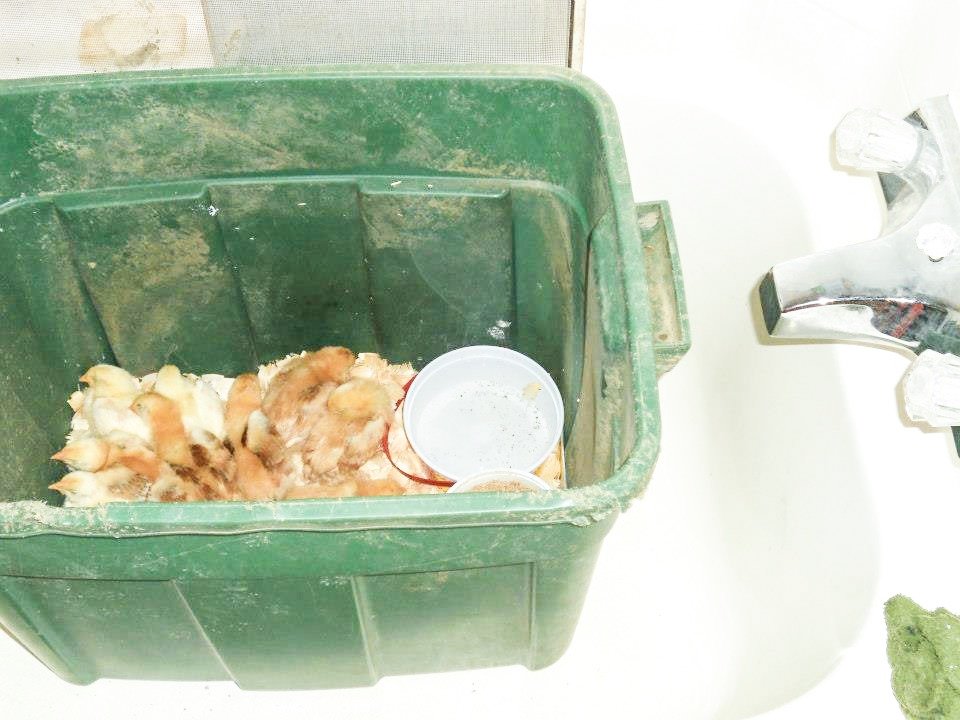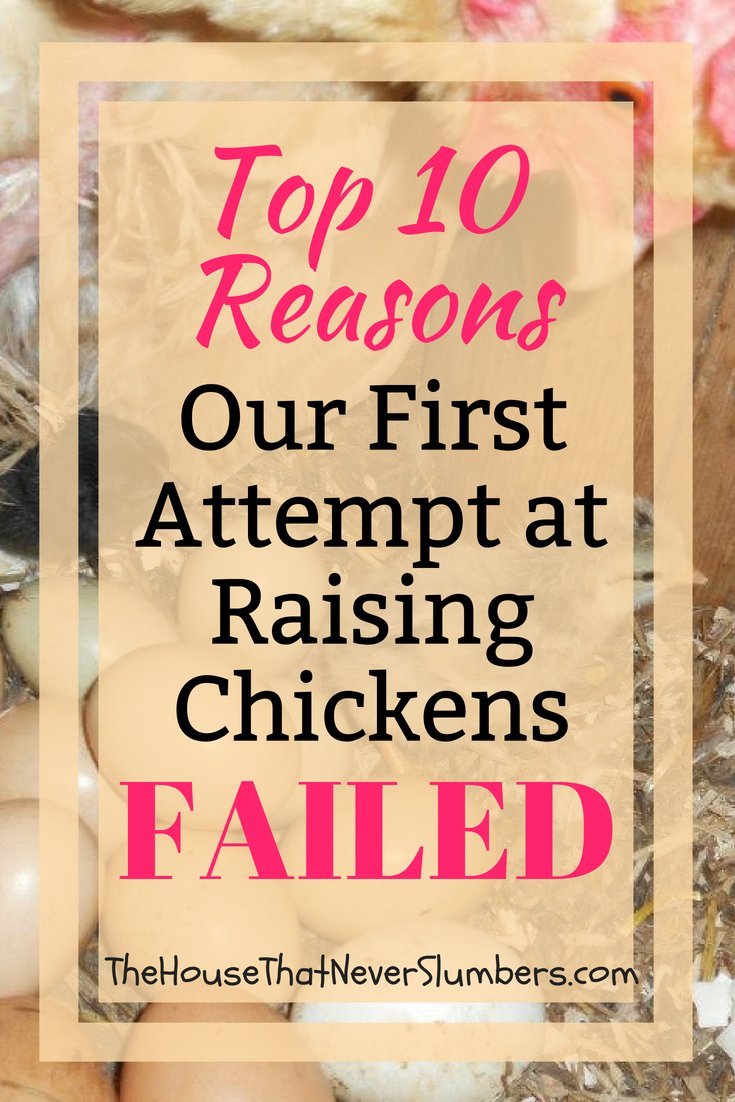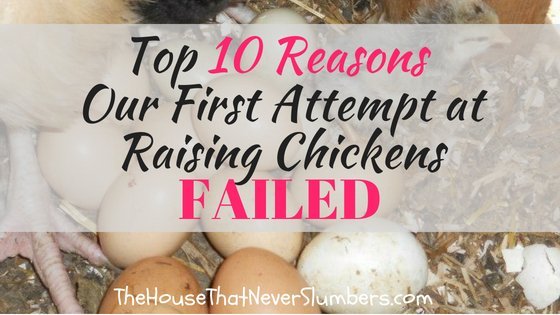Top 10 Reasons Our First Attempt at Raising Chickens Failed –
Several years ago, we tried raising chickens with somewhat disastrous results. So we recently did what any other crazy family would do and got chickens again.
Normal people might be deterred when their first attempt was a miserable failure, but we apparently just aren’t that kind of people. That would take a certain degree of human dignity to realize you don’t want to go through the shame of failing once again. We obviously have no dignity or self-respect, so we once again have chickens.
*This post contains affiliate links.
This list is not in any sort of ranking order (except the very last reason!), and it is, in no way, meant to be conclusive. There are probably 5 million other reasons we failed at chicken farming. These are simply the top 10 reasons our first attempt at raising chickens failed.
1.) We were peer pressured into getting chickens.
When we began homeschooling, we quickly realized that ALL real homeschoolers have chickens. Even the homeschoolers in the city were getting chickens. Some of them were having to fight their local governments to change zoning laws to be able to keep chickens within city limits. Here we were living on plenty of land, and we didn’t have a single chicken. We felt like complete outcasts.
Every family we came into contact with at any homeschool function was pressuring us to get chickens. (Okay, so no one really ever said a word to us about needing to get chickens, but if we went to their houses, we could see that all real homeschoolers have chickens, so we knew they were looking down on us.) We knew we had to get chickens if we had any hope of ever fitting in with the hip crowd.
I’ve never once been tempted to smoke or do drugs or anything like that, but the temptation to get chickens to be just like everyone else was too much to bear.
2.) We had no clue what we were doing.
We live in the country, and we’ve taken care of animals lots of times. My mom grew up with chickens. My grandparents always had chickens. I assumed I could inherit some chicken raising know-how. I guess chicken farming doesn’t quite work that way. I was going to check out Storey’s Guide to Raising Chickens from the library because some of my friends said it was a good guide, but it must have been too good of guide because it was never on the shelf. After a couple of tries, I gave up on checking out the book. I didn’t want to mess with putting it on reserve.
I mean, how hard could it really be to raise chickens?
3.) We did not prepare before getting baby chicks.
I know some people might build a coop and brooding pens in preparation for getting chickens, but that’s not the way we roll. We walked into a farm store one day, and there were these cute, little baby chicks in a trough. We had been kind of, sort of discussing the idea that we might want to get chickens some day. We walked out of the store with a half-dozen random baby chicks because they were fuzzy, and our kids had money from an Easter Egg Hunt they wanted to spend.
It seemed like they were being responsible with their money by wanting to buy something useful like chicks. If they wanted to foot the bill for chickens, we decided to let them. (Let me just say, this did not turn out to be a very cost-effective decision to think allowing our kids to pay a couple dollars each for these chicks was somehow saving us money.)
So we came home from the farm store with six baby chicks and a heat lamp. We had to keep them in one of our bathrooms, and that, in itself, is not such a great idea. Chickens are pretty dusty. They also smell a bit. They poop a lot and pee a lot, and their bedding starts to smell like ammonia.

4.) Our chickens kept multiplying until there were way too many.
We only walked out of the farm store with six baby chicks the first time, but then we had to go back to the farm store to buy a waterer because the chicks just kept dumping the plastic whip cream container we were using for water. Of course, the chicken paraphernalia is right back with all those cute baby chicks. There were several additional types at this store, so we had to get a couple of each color.
The kids ran out of money at about a dozen chicks, so you would think our chick-buying craze would end there, but my husband has a job where he drives around all day to meet with clients. Some days he will be in three or four different towns in the same day. Since chickens need a lot of stuff, I kept having to ask him to stop and pick up another heat lamp or more bedding or more chick starter. Every time he walked into a farm store, he walked out with more baby chicks. Before long there were dozens of chicks in our bathtub.
5.) We started too many projects at once.
We took on way too many projects at one time. We didn’t just get dozens of chickens. We got dozens of chickens, plus a few ducks, plus some turkeys, and a pony. We also started a garden. I wanted our family to be more self-sufficient. I wanted to know where our food was coming from and how it was being grown, but I also wanted my kids to know how to produce food for themselves if they ever needed to do so for whatever reason.
We were also put in charge of the local baseball/softball diamond at that same time. Keeping up with the ballpark was like keeping up with another property. The ballpark had to be mowed. The ballpark toilets had to be fixed. The pipes were always leaking at the ballpark. As we fixed one broken thing after another at the ballpark, our own home and land deteriorated further and further into disrepair and junkiness. We couldn’t even get our own yard mowed half the time, let alone try to figure out how to take care of all these random poultry that didn’t want to stay in fences.
Pin this!

6.) We let the chickens be totally free-range.
Free-range is definitely the option that gives you the healthiest eggs. The chickens are getting to eat all the bugs, worms, and natural vegetation their little hearts desire. We initially tried to keep the chickens in the fence with the pony. We clipped their wings. They could still fly. We clipped their wings again, and they still found ways to get out of the fence. We gave up and let them roam.
They destroyed my Hostas by using them as nests. They dug up all my Hen & Chicks (which my grandma said there was no way I would be able to kill). They pooped all over the deck. I had to put a fence around my garden to keep them from eating all our vegetables, and they still found a way into the fence.
Some of them were hit by cars. They wouldn’t go into their coop at night. Instead, they all roosted on top of the chicken coop which meant they were in danger from predators.
They laid their eggs in a million different places, so we weren’t even able to collect most of the eggs. This did result in home-hatched chicks a couple of times which was one of the very few positives of freely roaming chickens. The home-hatched chicks were adorable, but they really just added to our already overpopulation of chickens.

Their eggs were amazing because of their natural diet. The yolks were the darkest orange you will ever see in an egg. But there was just no way to contain them. These chickens were completely unruly.
7.) We were never home.
During the three or four years we had chickens the first time, our oldest daughter was playing basketball year-round on a team that traveled. During the spring and summer months, she had tournaments most weekends. We would often leave while it was still dark in the mornings to drive to another state and not get back until after dark in the evening. Many weekends required hotel stays. This was not a situation conducive to keeping animals.
We eventually let our daughter stop travel ball. That could be its own post someday. It was destroying our lives. It was extremely unhealthy for our child and extremely unhealthy for our family, in general. We all finally agreed it was too much, but that was after we already gave up on chickens.
8.) Our kids were too young to be completely responsible for the chickens.
At that time, the only child old enough to reliably care for the animals was the one always at practices or games. The younger kids were willing to help, but they couldn’t do most of the watering and feeding alone. My husband and I had enough to take care of in the house and yard that adding chickens to that mix was overwhelming.
9.) We did not have proper electrical or water lines running out to the chicken coop.
We had to use the regular garden hose attached to the outside faucet on our house for watering the chickens. This was fine in the summer. It became problematic during Indiana winters when outside faucets freeze.
You know all those fire safety demonstrations that say you shouldn’t daisy chain a bunch of random extension cords? Well, we had an interesting array of cords running to our heat lamps. The extension cords had to be moved for mowing. The extension cords made me nervous in rain and snow. They were also a tripping hazard and an eyesore.
10.) The goats were the last straw.
We spent three years learning how to raise chickens by trial-and-error, and we actually thought we had it all figured out. We even designed this super cheap but functional chicken tractor for our meat birds. You’ll want to check out that chicken tractor post if you have chickens!
But then the kids saved up enough money to buy goats. We thought this would be a great idea because we assumed they would eat the grass in the fenced pasture and reduce the amount of mowing. This was a false assumption. They did not eat grass. They ate some weeds, but they let the grass grow right up around them until it was taller than their heads, and you could barely see them.
They did not eat grass, but they did eat plastic, metal, cardboard, wood planks, and anything else we did not want them to eat. The chickens were unruly, but the goats were downright delinquent!
They destroyed everything in their path. Other people tell us how sweet and calm their goats are. I don’t know what kind of goats they are buying. Our goats were African Pygmy goats, and they were like little tornadoes.
Baby goats are just adorable when they are born, but DON’T BE FOOLED BY THEM! It takes a human baby the better part of a year to even think about walking on his own. Little goat babies are walking the minute they slide to the ground. They get right up and start looking around for something they can destroy. Within hours they are frolicking around their mother and climbing anything near them. They climb right up and roll right down, and you’re watching them like, “You were just born two hours ago! Can you just sit still for a minute and not give yourself shaken baby syndrome the very first day you are born, please?!”

These goats only get more destructive with every day of their life. You cannot leave anything in their fence because they will do something bad with it. I can’t even count how many times I’ve had to remove a bucket from a ram’s head. They stick their head in the bucket to eat whatever is in there, and then somehow they get the bucket handle over their horns. Then they go running around like crazy, shaking their heads all over the place, running into stuff and bouncing backward.
Because we had a creek running through our fenced pasture, it was impossible to keep items out of their reach. The creek would wash all sorts of random displaced containers and bags and other stuff up on the banks, and every single one of those items ended up tangled up in a goat’s horns. The stupidest of the goats managed to get what appeared to be an entire spool of fishing line tangled through every part of his body. My husband had to use pliers to surgically remove the hook from that goat’s flesh.
The chickens did not stay in the fences because they could fly. I never personally saw one of our goats fly, but they found some way out of the fence no matter how many precautions we took to secure them. They needed a fortress. They actually chewed through one part of the metal fence.
Then they found the way to my strawberry patch which I had been carefully tending for two years. The strawberries were finally mature enough to harvest that summer, but the destructo-goats demolished every bit of my strawberry patch. Then they moved on to my fruit trees.
We had purchased $120 worth of apple, pear, peach, and plum trees at the end of one season when they were discounted. We planted them during a drought. Everyone told me the trees would never make it because it was so dry that summer. I carried five-gallon buckets of water to these fruit trees daily for weeks. The trees survived and were thriving the next spring.
We even had the trunks covered with that corrugated plastic drainage tile to protect them from animals. That tile was no match for goats. We came home one day to the goats roaming our yard and every one of my fruit trees snapped in two or with a 360-degree rub around the trunk which ultimately cuts off the nutrients to the leaves and kills the tree.
But none of that was the last straw on our attempt at raising chickens. Our chicken farming ended because the goats repeatedly rammed their heads into the walls of the chicken coop. At first, they just made holes that we patched, but they eventually butted all four walls of the coop completely off the frame until the coop was just a skeleton of 2 x 4’s.
We are raising chickens again!
We took a break from chickens for several years, but we are giving it another try, and it’s going so much better. We had been toying with the idea of getting chickens again all winter. Then a friend was moving back into town and needed someone to take four hens with just a couple of days’ notice, so we adopted chickens.
Getting the hens to our house was a bit of an adventure. The straps that hold the gas tank to our old truck finally rusted through while he was diving them home. Fortunately, he was on the backroads and only a mile and a half from our house when the straps snapped. I had to bring him ratchet straps, and then he had to crawl under the truck which was still in the middle of the road, while it was pouring down rain to ratchet strap the gas tank in place for the rest of the trip home. The hens were happy as could be the entire time.
These chickens came with their own coop. The coop is small, and they stay in it fulltime. We move the coop every few days to give them access to new grass. It’s similar to this coop, but ours doesn’t have wheels. Two people just pick it up and slide it to the new patch of grass.
The four hens were not laying at all when we moved them here, but once the days started getting longer, they started producing again. We are collecting about 3 eggs a day now.
We also have 6 baby chicks, 2 ducklings, and 4 turkeys poults. All will eventually be moved to a small fenced area together. Meet our ducklings, Kevin and Honey! We’ve assumed their genders for now. We might have to change Kevin’s name later.

You can follow our crazy poultry adventures on Instagram where I regularly post pictures or on Facebook where we share pictures and have a few live videos of poultry playtime. You can also find quick tips in our social media posts about how we’re housing all these silly birds. Our tractor tire brooding house for the ducks was our middle daughter’s design, and the rabbit hutch we’re using for the chicks was built by our son.
Do you raise poultry? What are your best poultry hacks?
Please like, share, pin, tweet, follow, and subscribe to The House That Never Slumbers!






Hey there!
I stumbled upon your article about the top 10 reasons why your first attempt at raising chickens failed and I must say, I can relate to almost all of them. My family and I recently tried raising chickens for the first time and it was definitely a learning experience.
One of the main reasons we failed was because we didn’t do enough research beforehand. We assumed that raising chickens was easy and didn’t take into account the amount of time, effort, and money that goes into it. It wasn’t until we were knee-deep in chicken poop and feathers that we realized we had underestimated the task at hand.
Another reason we struggled was because we didn’t properly prepare our coop and run. We built it ourselves and although it looked great, we didn’t take into consideration important factors such as ventilation, predators, and cleaning. It was a mess and we quickly realized that we needed to make some changes to ensure our chickens were healthy and safe.
Overall, I appreciate you sharing your experience and tips for raising chickens. It’s reassuring to know that we’re not alone in our struggles and that with proper research and preparation, we can successfully raise our feathered friends. Thanks for the helpful advice!
Here is my website:1321downtown.com
Thanks! There’s definitely a learning curve to raising chickens.
Oh, man, that does sound overwhelming! You kind of cured me from ever wanting goats, too. Lol I thought they were so cute and wanted to have some one day (not at this house in the suburbs, though). I’m glad the chicken situation is working out well now. There’s nothing like being able to go gather your own eggs and grow your own food. I got to do some of that growing up. 🙂
Don’t take my word for it on the goats! You should try them yourself, at least long enough to see a couple of newborns. They really are the cutest. Some people love goats and have no issues. Most of the people I know who say their goats are well-behaved have the full-sized goats. We had a type of pygmy, and the smaller size probably made it easier for them to escape. We are also horrible fence builders, and our property is tricky because of a creek that runs right through the middle. We had trouble securing the fence at the creek without creating a situation where debris built up at the fence panel and backed up the water, so there was always a gap that the goats could find if they swam.
Hello Christa,
Your post made me think about my good old days back in India when I had chickens. When I was a child it was my responsibility to take care of the chickens. They were used to my voice and would come any time I called. Glad that you were to raise chickens and ducks. It’s good that you can enjoy the eggs from the chickens you raise.
There’s definitely nothing like walking out to fresh eggs every day!